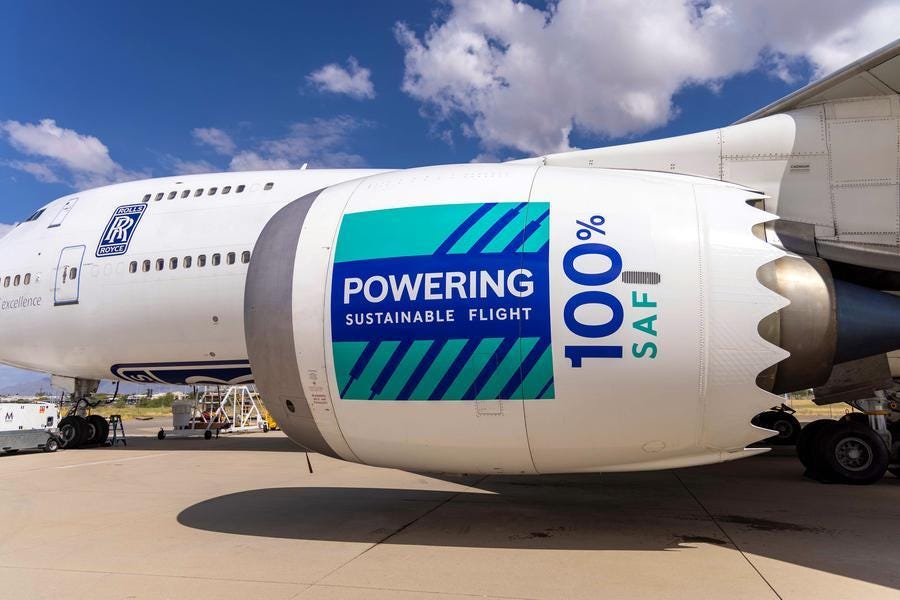#Sustainability20: Rolls-Royce Calls Off Bets On Electric Planes, Says Low-Carbon Fuel Is The Future & More
Weekly Roundup - 08/12/23
Each Friday, we publish a round-up of the 20 most important stories on sustainable aviation. You can see previous editions of #Sustainability20 here.
Industry Updates
At COP28, aviation industry leaders defended against criticism over carbon emissions, emphasising their commitment to decarbonisation but highlighting the need for government and private sector support. They advocated for financial assistance to increase sustainable aviation fuel (SAF) production.
Rolls-Royce CEO Tufan Erginbilgiç says it’s time to sell off its electric jet engine unit and focus on other strategies – namely SAF.
IATA’s chief economist urges the oil and gas sector and alternative fuel producers to ramp up production of greener aviation fuel to aid airlines in reducing carbon emissions. SAF currently constitutes only 0.2% of global jet fuel usage and costs significantly more than traditional fuel. Investment in SAF production remains low compared to the oil and gas sector’s profits.
Air Canada has joined Airbus’ Carbon Capture Offer, becoming the first North American airline to adopt Direct Air Carbon Capture and Storage (DACCS) technology. This initiative, in partnership with 1PointFive, will issue carbon removal credits.
CLIMATE WATCH: How Much Can Forests Fight Climate Change? A Sensor in Space Has Answers. - The New York Times
NASA’s new program using space-based sensors shows that protected areas globally are vital in storing carbon and combating climate change. These areas, despite being under threat, retain significant amounts of carbon, offsetting a year’s worth of fossil fuel emissions.
Infrastructure and operational efficiencies
Scotland’s largest airport-based solar farm, costing around £18.5 million, is being installed at Glasgow Airport in collaboration with Ikigai Group and Zestec Renewable Energy, covering 40 acres with a 19.9 MW capacity.
Gen Phoenix, formerly ELeather, is expanding beyond leather offcuts to include other waste streams for creating recycled products. It aims to offer airlines a solution for recycling end-of-life seat covers, with a focus on circular interiors. The company produces a unique material combining leather and textile, with plans to incorporate more recycled and bio-based content and reduce reliance on virgin fossil-based materials.
Air India has implemented ‘Aerowash’, an eco-friendly, automated system for washing aircraft exteriors. This technology, featuring a robotic micro-fibre brush drum, significantly reduces water usage, saving up to 30,000 litres per narrow-body aircraft and 75,000 litres per wide-body aircraft annually.
Lilium and Lufthansa are exploring a strategic partnership to introduce eVTOL aircraft to Europe. The potential collaboration would involve third parties to develop advanced air mobility infrastructure like vertiports and electric chargers, alongside working on airspace integration and operational processes.
The aim is to make airports carbon neutral and achieve net-zero emissions, including new Greenfield Airports.
Bristol Airport, England’s third largest airport outside London, has set a net-zero operations goal by 2030 for scope 1 and 2 emissions. It’s focusing on reducing scope 3 emissions, collaborating with airlines and partners on initiatives like electric ground vehicles and exploring hydrogen technologies. The airport is also installing solar panels, introducing electric buses and vehicles, and joining sustainability projects like the Aviation Carbon Transition Programme. The airport is also involved in government-funded projects for zero-emission aviation.
Air Canada has partnered with major European rail systems to provide a seamless travel experience for passengers, including unified check-ins and itineraries for journeys covering destinations in France, Germany, Switzerland, and Austria.
Sustainable Aviation Fuel (SAF)
Between 2022 and 2023, the production of SAF doubled but still only meets 0.53% of the aviation industry’s fuel requirements. Despite high demand from airlines, limited supply and high costs hinder wider adoption. Increased government incentives are needed to boost SAF production and help the industry achieve its carbon reduction goals.
A new tool, the SAFc Registry, developed by RMI, the Environmental Defense Fund, and others, including United Airlines and Microsoft, tracks the emissions impact of SAFs and encourages their use. The registry monitors SAF production and distribution, providing verifiable certificates to stimulate demand, allowing buyers to fund SAFs regardless of flight location, and ensuring accurate credit allocation.
Air Liquide selected for development of a large-scale SAF project in the U.K. - Chemical Engineering
Air Liquide Engineering & Construction is collaborating with Alfanar on the Lighthouse Green Fuels project in Teesside, U.K., to convert waste into SAF. Starting in 2028, the plant will process one million tonnes of waste annually.
New technology: Electric and Hydrogen
ZeroAvia, a hydrogen-electric technology developer, has signed a deal with Ecojet for 70 ZA600 engines and 80 ZA2000 engines. Ecojet, launched by Dale Vince in 2023 as the world’s first “green airline,” plans to start with conventional aircraft in 2024 and transition to green aircraft with ZeroAvia’s engines in 2025, potentially becoming the first electric airline. ZeroAvia’s ZA600 is nearing certification.
Air New Zealand begins its ‘Mission Next Gen’ low-emissions initiative with the zero-emission, battery-powered Alia plane from Beta Technologies. Set for commercial flights in 2026, it will initially carry parcels for New Zealand Post.
Dallas Fort Worth International Airport and Overair are collaborating to explore eVTOL aircraft operations and vertiport development in the DFW Metroplex, focusing on feasibility, infrastructure, policies, and operational procedures for sustainable air mobility services.
Brazil’s Eve Air Mobility and Flexjet have collaborated to test Eve’s Urban Air Traffic Management system for eVTOL operations, simulating it over four days in November 2023 at Farnborough Airport.
Brazilian airline Azul, through its regional division Azul Conecta, plans to convert its 27 Cessna Caravans to electric propulsion with Surf Air Mobility, partnering with MagniX and AeroTec. This move aims to cut carbon emissions and operating costs by 50%, potentially opening new routes.
EASA has granted a design organisation approval to eVTOL manufacturer Lilium for its Lilium Jet, affirming its compliance with commercial aircraft development standards. The Lilium Jet, designed for flights up to 175 kilometres, aims for service in 2026 and is also seeking FAA certification.




